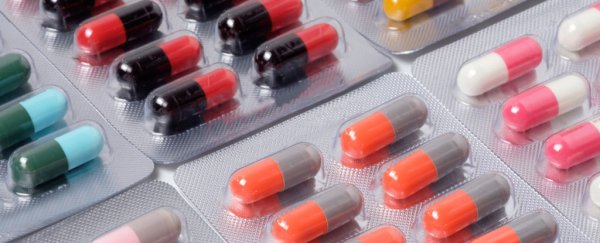Health experts have welcomed an announcement by pharmaceutical giant GlaxoSmithKline that it will stop seeking patent protections in developing and low-income nations, which will allow cheaper generic versions of name-brand drugs to be sold to the public.
While IP-protected medications can often be expensive even in high-income countries, in the world's poorest nations, they tend to be completely unaffordable. And until now, patents have prohibited generic alternatives from being sold to patients. To address this, GlaxoSmithKline recently released details of a softer approach to enforcing the company's intellectual property, reflecting a fairer system for poorer countries.
Under the new plan, GlaxoSmithKline says it will no longer file patents for its medicines in the world's 50 Least Developed Countries (LDCs) and Low Income Countries (LICs), which means that when it brings out a new HIV or cancer drug in places like Afghanistan, Rwanda, or Cambodia, it won't prevent other manufacturers from supplying generic, more affordable versions of the same medication.
The move is being hailed by health experts as a welcome development from one of the world's largest pharmaceutical companies, and while it could have been spurred on by rival companies Merck and Roche previously announcing similar initiatives, it's hard to disagree in principle with a move that could help make medicine more accessible to the world's poorest people.
"This is a brave and positive step towards broadening the access to important new medicines in the developing world," former president of the British Pharmacological Society, Raymond Hill, told the BBC.
"Access to medicines for patients on a global basis is vital and it is good to see an innovative approach like this to ensure this happens," added president of the Faculty of Pharmaceutical Medicine, Alan Boyd.
In Lower Middle Income Countries (LMICs), GlaxoSmithKline says it will continue to file for patents, but will work on licensing arrangements to allow the supply of generic drugs. (And in richer nations, it will be business as usual, with full patent protections.)
"Any one of these things would have been a big deal by itself. When you put them all together, it's quite a strong statement," director of Knowledge Ecology International, James Love, told Asher Mullard at Nature.
But while the new direction is being praised by some in the pharmaceutical industry, questions remain over how effective the scheme will actually be in terms of making medicines available to the world's poorest people. Many of these countries were exempt from patent enforcements until 2033 under a waiver from the World Trade Organisation – although the benefit of the new deal means such exemptions will no longer be necessary, especially if other pharmaceutical companies follow suit.
And even though the new plan in theory could help remove restrictions on access to medications for up to 2 billion people in 85 countries, others say the patent issue is only one part of the puzzle in improving health in remote and developing places.
"The impact of this move on the treatment of cancer and other diseases in each individual country will depend on whether there is a local adequate healthcare infrastructure that will allow the safe use of powerful new drugs in an appropriate group of patients," Hill told the BBC. "Many new cancer drugs are most valuable when used in sub-groups of patients identified by advanced diagnostic techniques that may not be available."
It's a point not lost on GlaxoSmithKline CEO, Sir Andrew Witty, who will step down from the company next year. But hope remains that this gesture will have a long-lasting impact of its own, even if only in terms of progressing the conversation about medicine in developing countries.
"Changes to patents and IP systems will not solve the multi-faceted challenges of improving healthcare in developing countries," Witty said in a press release. "However, we believe the measures outlined today add to the wider contribution GSK makes to improve access to effective healthcare around the world."
